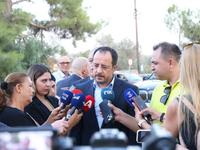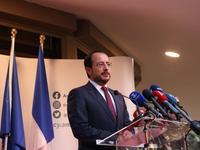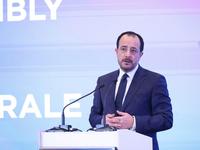Press Releases
27-08-2021 15:12
The President of the Republic received the credentials of the Ambassador of Germany
The President of the Republic, Mr Nicos Anastasiades, received the credentials of the new Ambassador of Germany, Ms Anke Schlimm, during a formal ceremony held at the Presidential Palace on Friday, 27 August 2021.
Presenting her credentials, Ms Schlimm, speaking in English, said:
“I have the honour of presenting you, Excellency, with the letter of credence with which the President of the Federal Republic of Germany, Frank-Walter Steinmeier, appoints me as ambassador extraordinary and plenipotentiary of the Federal Republic of Germany to the Republic of Cyprus.
It is with great pleasure that I take up my new role as German Ambassador to Cyprus. With drive, dedication and a keen sense of responsibility, I will strive to further deepen the ties between our two countries and to strengthen our cooperation as member states of the European Union, to which we are committed as a community of shared values.
Germany and Cyprus are historically bound by a long-standing partnership and friendship. In the coming years, I will strive to nurture and deepen Germany’s relations with Cyprus and its people in every respect. This includes foreign and security policy as well as business and also culture and education, an area where I see great potential for cooperation. It is particularly important to us to communicate and liaise closely on all issues relevant to European policy.
As a friend of Cyprus and its people, Germany is supporting and assisting the United Nations’ efforts to ensure that negotiations on a solution to the Cyprus issue resume. It is painful to think that Cyprus has de facto been divided since the Turkish invasion in 1974 and that it has not yet been possible to heal this division. In light of our own history as a once-divided country, although in Germany’s case this was not due to ethnic or religious differences, we are particularly keen to support and assist the process of reunifying Cyprus.
We hope that the parties involved will work towards engaging in serious negotiations on the basis of the UN resolutions passed to date, which envision for Cyprus “a bi-communal, bi-zonal federation with political equality”, and that the informal 5+1 talks initiated by UN Secretary-General Guterres will lead to a resumption of the negotiation process. A crucial part of this process will be for the Greek Cypriot and Turkish Cypriot communities to reach an agreement on the nature of their future coexistence on the island and to draw up a viable solution to the Cyprus issue. This would create the conditions necessary to ensure security, stability and prosperity for Cyprus, Europe and the entire eastern Mediterranean.
The possibility of a rapprochement in the dispute over maritime boundaries and natural gas exploration in the eastern Mediterranean is closely tied to the Cyprus issue. Germany is advocating talks to find a solution which complies with international maritime law. Reaching an agreement on the delimitation of territorial claims in the Mediterranean Sea will require a pragmatic and flexible approach. This could also pave the way for cooperation which would benefit all sides, rather than mutually exclusive competition for natural gas reserves. Germany stands ready to explore open channels of communication and specific opportunities for cooperation with all parties involved in this dispute over maritime boundaries.
We are closely monitoring the number of new arrivals in Cyprus and consequently the number of asylum requests. Cyprus already has options for cooperation on this issue at the level of the European Union. With regard to managing migration, we also aim to provide bilateral support as part of the bilateral action plan.
Germany is an active participant in the UNIFIL mission in Limassol and currently commands its Maritime Task Force. By playing a part in this mission, Germany and Cyprus are actively contributing to security and defence in the region, which is important not least in light of the recent outbreak of violence in the Middle East.
I very much hope that it will be possible to expand and deepen business and trade relations between Germany and the Republic of Cyprus yet further in the coming years. All major German brands already have a presence in Cyprus. The deep economic recession caused by the COVID-19 pandemic is concerning; in Cyprus, the tourism sector is particularly affected. I see greater potential for cooperation in this area in the post-COVID age. A much larger number of German tourists should holiday in Cyprus in the future. I also see fresh potential for cooperation between our two economies in the field of renewable energies, where German businesses are internationally renowned for their outstanding expertise. The recovery and resilience plans drawn up as part of NextGenerationEU offer a unique opportunity to transform our economies and to strengthen their resilience and potential for growth.
One particular priority for me will be closer cooperation between our two countries in the field of education and culture. The key to this is the status of the German language – I would very much like to boost its standing within the Cypriot school system. There has been a remarkable increase in the number of young people in Cyprus who are interested in studying in Germany. The German language does not need to be an obstacle to them, as many German universities now offer degrees and other programmes taught in English. At the same time, Cyprus is an increasingly popular destination for German students. We can expand Erasmus exchange programmes to enable exchange on an even larger scale in both directions.
Personally, I have a special interest in the process of reconciling the two Cypriot communities. In my school days I myself took part in programmes to further Franco-German understanding. These encounters sparked friendships which have stood the test of time. The friendship between France and Germany has grown deep roots, partly as a result of political will and active efforts towards reconciliation between these two former enemies in the heart of Europe. As a student, I was in Berlin when the Wall came down in 1989. The groundwork for the fall of the Wall was laid by a policy of reconciliation and rapprochement and by decades of civil society dialogue. In light of this history, one aspect of the cultural cooperation between Germany and the Republic of Cyprus to which I feel a particular connection is the project Imagine, which aims to build confidence and foster reconciliation between teachers and school pupils from the Greek Cypriot and Turkish Cypriot communities.
One pressing task that we must tackle together in the coming months is the ongoing fight against the COVID-19 pandemic – both within the European Union and worldwide. This is a test of our mettle which will require all of our solidarity. I very much hope that, as vaccination campaigns progress, it will soon be possible to restore fundamental rights and freedoms for all, and we will once again be able to enjoy travel and tourism and meet with one another face-to-face.
I am greatly looking forward to the work that lies ahead of me in Cyprus. Over the last year I was able to prepare for my new posting by learning some Greek, and I can say that this language is very close to my heart. I hope to be able to improve my Greek skills through many personal encounters with Greek Cypriots in the coming years.
In closing, Mr President, allow me to convey warm wishes from Germany to you and the Cypriot people”.
Receiving the credentials, the President of the Republic said:
“It is with distinct pleasure that I receive today your Letters of Credence appointing you as the new Ambassador of the Federal Republic of Germany to the Republic of Cyprus. Please accept my sincere congratulations for your appointment and my warmest wishes for every success in your important work. I would like to assure you that my Government, and I personally, will provide you with every assistance deemed necessary in the performance of your high duties.
Our bilateral relations have been evolving rapidly in recent years, undoubtedly providing a solid foundation on which we can build so as to further deepen our cooperation, especially in the fields of trade, defence, services, education and tourism. In this respect, Cyprus fully appreciates the efforts undertaken by Germany, amongst others, through the work of the Goethe Institute which strengthens the dialogue and cooperation in a practical way between the people of our countries, and thus establishing a successful social link between Cypriots and Germans which continues to thrive.
In times of crisis like these, where geopolitical uncertainty, war, uprooting and human migration are just of the few challenges Europe is faced with, it is important to recall our own experiences and draw inspiration from the success story of the reunification of Europe and the founding of the European Union. Germany, a country at the forefront of all these historical developments, is rightly called on today to provide both solidarity and leadership in these testing times.
Moreover, at this critical juncture for the EU, I wish to underline that our goal remains our close and resolute cooperation, aimed at addressing jointly and effectively the challenges faced by our European family today. It is essential to preserve our democracies, our European values, our unity and our solidarity, so that Europe can emerge stronger, unified and able to offer stability and prosperity to all of its people.
Our shared vision for an Eastern Mediterranean that is restored to conditions of prosperity, stability, safety and security is something that our two countries intend to continue working honestly and diligently to achieve.
Excellency,
We greatly value Germany’s interest in bi-communal activities in the framework of bringing the two communities together and facilitating efforts for the reunification of Cyprus. Cyprus has never stopped supporting bi-communal programmes. We are convinced that the ramifications from reuniting Cyprus will prove healing on several levels. In a region where the challenges of asymmetric threats are vivid and in which stability is all the more proving to be an expensive commodity, a viable and durable solution to the Cyprus problem which will reunite the island, its people, its economy and its institutions will resonate not only within the country and in the immediate region, but even further afield. We trust that the Federal Republic of Germany and the German people understand this concept more than any anyone else.
Excellency,
Having said that, I would like to take this opportunity and express my deep appreciation for Germany’s principled stance on the Cyprus issue and your consistent support on our efforts to reach a lasting and comprehensive settlement, based on the relevant UN Security Council resolutions.
During the recent informal meeting for Cyprus in Geneva, I exerted every effort to achieve a breakthrough that would permit the start of meaningful negotiations on the agreed basis and from where the negotiations were left off in Crans Montana.
Unfortunately, the demands of Turkey and Mr Tatar - as officially stated in the paper they submitted in Geneva - for the recognition of the sovereign equality and of the equal international status of the “trnc” put a stumbling block in our efforts to achieve the desired breakthrough.
Despite the setback, we maintain our commitment and decisiveness to continue and enhance our efforts until Turkey is persuaded to change course and align with the agreed UN framework and the decisions of the European Union.
As regards the issue of Varosha, we strongly condemn the recent announced decisions and series of illegal actions undertaken by Turkey. These actions and provocations are contrary to all relevant UN Security Council resolutions, including its latest resolution 2587 (2021) and the Presidential Statements of 23 July 2021 and 9 October 2020, in which the Security Council reaffirmed the status of Varosha as set out in relevant resolutions, including Resolutions 550 (1984) and 789 (1992), expressed its deep concern and condemned the unilateral announcements by Turkish and Turkish Cypriot leaders, on 20 July 2021, on the further reopening of a part of the fenced-off area of Varosha that run contrary to its previous resolutions, and called for the immediate reversal of this course of action and the reversal of all steps taken on Varosha since October 2020.
Excellency,
In closing, I wish to assure you, yet again, of my Government’s full support in the discharge of your important duties, and while welcoming you to Cyprus, I would kindly request that you convey to Her Excellency Chancellor Merkel my warmest greetings and a message of friendship and solidarity.
Ambassador Anke Schlimm, I warmly welcome you to Cyprus”.
(SCH/ΕH)







